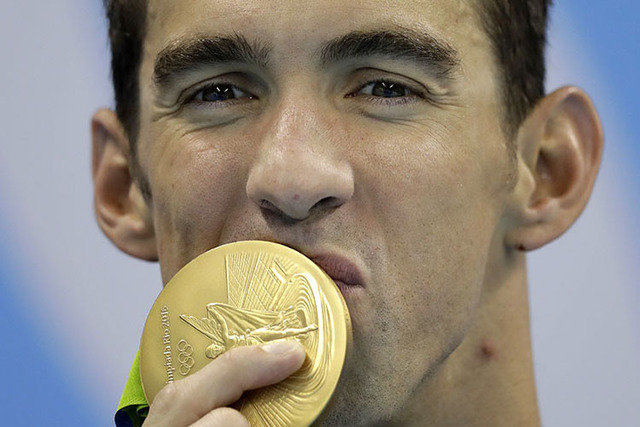Michael Phelps wins 20th, 21st Olympic gold medals

RIO DE JANEIRO — Michael Phelps sat alone, thoroughly exhausted. He put his head in his hands and then motioned at his neck as though he had nothing left to give.
No need.
His work was done.
He had his 20th and 21st gold medals.
Phelps made up for one of the rare losses in his brilliant career by winning the 200-meter butterfly Tuesday night, a triumph that sent him climbing into the stands to kiss his 3-month-old son Boomer. An hour later, he returned to take what amounted to nothing more than a triumphant victory lap in anchoring the 4×200 freestyle relay, the crowd’s deafening roar growing louder with every stroke.
This was another performance for the ages, but Phelps has done it so many times that nothing else would have been fitting. It came on a night that American teammate Katie Ledecky picked up her second gold of the Rio Olympics on the way to what could be a historic run of her own in the pool.
Phelps now has 25 medals in all, and three more races in Rio to add to his almost unimaginable total.
The 200 fly was the one he really wanted, and it showed.
With challengers all around, Phelps simply wouldn’t be denied.
After touching the wall first — by a mere four-hundredths of a second — he held up one finger. Then he sat on a lane rope, egging on the roaring crowd at the Olympic Aquatics Center with both hands, before emphatically pumping his fist.
Tears welled in his eyes during the medal ceremony — until somebody in the crowd cracked him up. Then, during the customary stroll around the pool to pose for photographers, Phelps broke ranks and bounded into the stands to plant a kiss on Boomer, the son who symbolizes just how much Phelps’ life has changed since a second drunken-driving arrest two years ago.
Phelps held off Japan’s Masato Sakai with a time of 1 minute, 53.36 seconds, but that number was of little concern.
The only thing that mattered was getting to the wall first.
Four years ago, Phelps mistimed his finish in the wind-milling stroke he does better than anyone, gliding to the wall a little too long after his final whirl of the arms. That allowed Chad le Clos of South Africa to stunningly win gold in an event that Phelps had dominated for the better part of a decade.
Phelps retired after the London Games, so it looked like he wouldn’t get a chance to make up for his defeat. But when he decided about a year later to start competing again, the 200 fly was clearly the title he sought more than any other.
Le Clos was in the final again, thoroughly inspired himself by his mother and father, both battling cancer and in the stands cheering him on.
But the South African could only manage fourth this time, also finishing behind bronze medalist Tamas Kenderesi of Hungary.
The relay was much less dramatic.
Conor Dwyer, Townley Haas and Ryan Lochte went out ahead of Phelps, handing off a commanding lead to the most decorated athlete in Olympic history.
Phelps essentially spent the next 100 seconds or so soaking up the cheers. He was only the third-fastest swimmer on his team, but he was a full body length ahead of Britain’s James Guy when he touched in 7:00.66.
The British claimed silver in 7:03.13, while Japan took the bronze in 7:03.50.
Sure, Phelps hogged the spotlight on this night, but let’s not forget two other very impressive swimmers.
Ledecky took the most challenging step toward a feat that’s only been done one other time, holding off Sweden’s Sarah Sjostrom to win the 200 freestyle and give the American star her second gold of the games.
Debbie Meyer is the only female swimmer to capture the three longest freestyle events at a single Olympics, winning the 200, 400 and 800 at Mexico City in 1968. Ledecky looks like a lock to match Meyer, having already won the 200 and 400 titles and an overwhelming favorite in the 800, where she’s the world-record holder and far faster than anyone else in the world.
Katinka Hosszu is having quite an Olympics, too.
The Hungarian known as the “Iron Lady” earned her third gold medal of these games with a victory in the 200 individual medley.
This has been an Olympic of redemption for Hosszu, a long-time star at the world championships who always seemed to come up short on the biggest stage.
Not anymore.
Hosszu added to her wins in the 400 IM and 100 backstroke with a time of 2:06.58. Siobhan-Marie O’Connor of Britain challenged Hosszu all the way but had to settle for silver. Maya DiRado of the United States held on for the bronze.